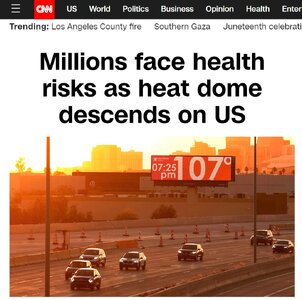Today's website headline. These guys lol.
I'll fix it: Summer Arrives. It'll Be Hot Like it Always Is This Time of the Year.
View attachment 25941
To break this down a bit. Bit of a rant, but bear with me.
And with the below, I do not bring up climate change at all, so please keep that in mind.
1) This notion of using "millions at risk" -- pure media marketing hype ploy to get clicks and scare people.
"Millions at risk" happens by default always when it is hot, cold, wet, snowy, windy, whatever -- that's what
synoptic-scale systems and patterns do! And the population of the U.S. is 341 million, so why wouldn't
millions *not* be at risk any given day for some type of weather? And "at risk," some level of risk is always
present every day from weather (we live on a hazardous planet). This is nothing out of the ordinary and
the reality of life.
2) Heat dome - merely a repackaged way to say "hot weather" or "heat wave." Changing up the lingo is a
common tactic to again, get clicks and scare people with "new" words and esoteric/arcane weather terms.
"Polar vortex" use in the mainstream starting about 10 years ago was like this. You can call or label whatever
you want, that physically doesn't change what it is.
I have said this, and stand by it -- when it comes to weather these days, the ordinary is turned into the extraordinary.
There is no parsing out of run-of-the mill events that are not so anomalous or just normal, and those that are.
It is just full throttle, to the max all the time. All weather is "extreme" (look the banners at the bottom of the screen
any time weather is a story, you will often see the "extreme weather" label). It is as if no impactful/inclement weather
should not ever occur? What planet are those that think or push this narrative living on?
I get the line often to rebut the above "more alerts/warnings/awareness saves lives and keeps people informed."
This is true, but *only* to a point. More is not always better. There comes a point of diminishing returns. Crying
wolf all the time, and acting like every weather event will be extreme. makes people apathetic and untrusting,
which in turn does harm on multiple levels.


